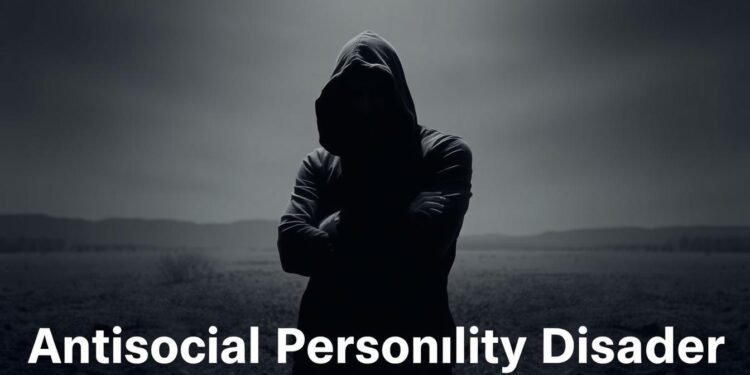Have you ever wondered why some individuals struggle with empathy and consistently disregard societal norms? This behavior often stems from a complex mental health condition known as antisocial personality disorder (ASPD). Affecting approximately 3% of U.S. adults, this condition is more prevalent in men, with a 3:1 male-to-female ratio.
Early warning signs, such as childhood conduct issues or cruelty to animals, can indicate the development of this disorder. Left untreated, it often leads to severe complications, including substance abuse—seen in 60% of cases—and a higher risk of incarceration. Understanding the causes, symptoms, and treatment options is crucial for addressing this challenging condition.
In this article, we’ll explore the diagnostic criteria, examine the biological and environmental factors contributing to ASPD, and discuss the challenges of finding effective treatment. Let’s dive into the details to better understand this often-misunderstood mental health issue.
Key Takeaways
- ASPD affects about 3% of U.S. adults, with men being three times more likely to develop it.
- Early signs include childhood conduct problems and cruelty to animals.
- Substance abuse is a common complication, occurring in 60% of cases.
- Individuals with ASPD face a higher risk of incarceration.
- Understanding the causes and symptoms is essential for effective treatment.
What is Antisocial Personality Disorder?
Behavioral patterns that violate others’ rights often stem from specific mental health conditions. One such condition is characterized by persistent manipulation and disregard for societal norms. This condition is typically diagnosed in adulthood, but its roots often trace back to childhood conduct issues.
According to the DSM-5, diagnosis requires at least three symptoms from specific behavioral categories. These include deceitfulness, impulsivity, and a lack of remorse. Such behaviors can significantly impact relationships and social interactions.
Definition and Overview
This mental health condition involves a long-term pattern of exploiting or violating the rights of others. It is not simply a matter of occasional poor judgment but a consistent disregard for societal rules. Early signs, such as aggression or cruelty to animals, can indicate its development.
How It Differs from Other Personality Disorders
Unlike borderline personality disorder, which is marked by emotional instability, this condition involves calculated manipulation. It also differs from narcissistic personality disorder, where grandiosity is more prominent. In severe cases, it may overlap with psychopathy, which has distinct neurological markers.
Causes of Antisocial Personality Disorder
Understanding the root causes of persistent behavioral issues can shed light on complex mental health challenges. This condition is influenced by a combination of genetic, environmental, and biological factors. Each plays a significant role in shaping behavior and emotional responses.
Genetic Factors
Research shows that genetics contribute significantly to the development of this condition. Twin studies reveal a heritability rate of 50-60%. Specific gene variants, such as those affecting the MAOA enzyme, are linked to impulse control issues. These genetic factors can increase the likelihood of behavioral challenges.
Environmental Influences
Childhood experiences also play a critical role. Trauma, such as abuse or neglect, triples the risk of developing this condition. Prenatal factors, like maternal smoking or alcohol use, can further exacerbate risks. Early intervention is key to mitigating these environmental impacts.
Brain Biology and Serotonin Levels
Brain structure and chemistry are equally important. Neuroimaging studies show reduced gray matter in the prefrontal cortex and decreased amygdala responsiveness. Serotonin dysregulation is linked to impulsivity and aggression. Understanding these biological factors can help tailor effective treatments.
Symptoms of Antisocial Personality Disorder
Recognizing the signs of persistent behavioral issues can help in understanding complex mental health conditions. These symptoms often manifest in distinct ways, affecting behavior, emotions, and social interactions. Early identification is crucial for addressing the challenges associated with this condition.
Behavioral Symptoms
Individuals may exhibit deceitfulness, impulsivity, and aggression. These actions often lead to repeated conflicts with the law. Pathological lying is common, with studies showing 82% of individuals engaging in this behavior. Criminal versatility, such as committing multiple types of offenses, is also a hallmark.
Emotional Symptoms
Emotional poverty is a key feature, often masked by superficial charm. A lack of remorse for harmful actions is prevalent. These individuals may also show no anxiety about the consequences of their behavior. Their speech patterns often include fewer emotional words, reflecting their detachment.
Social Symptoms
Socially, these individuals may adopt a parasitic lifestyle, relying on others for financial support. They often manipulate or exploit those around them. Their disregard for societal norms can lead to strained relationships and isolation. Understanding these symptoms can help in providing appropriate support and intervention.
Risk Factors for Developing Antisocial Personality Disorder
Identifying the factors that increase the likelihood of developing behavioral challenges is essential for early intervention. These risks often stem from a combination of childhood experiences, family dynamics, and environmental influences. Understanding these factors can help in creating effective prevention strategies.
Childhood Conduct Disorder
Research shows that 95% of individuals with this condition exhibited conduct disorder before the age of 15. Early signs, such as fire-setting or cruelty to animals, have a 70% correlation with later behavioral issues. School suspension before the age of 12 is another red flag. Addressing these behaviors early can significantly reduce risks.
Trauma and Abuse
Adverse Childhood Experiences (ACEs) play a critical role. Individuals with an ACEs score of 4 or higher face a fivefold increase in risk. Trauma, such as abuse or neglect, can disrupt emotional development and lead to long-term challenges. Stable mentorship and supportive environments can act as protective factors.
Substance Use and Family History
Family history is a significant predictor. For example, 40% of individuals with an alcoholic parent develop this condition. Polysubstance use doubles the likelihood of diagnosis. Early exposure to alcohol or other substances can exacerbate risks. Protective factors, such as high IQ and stable family relationships, can mitigate these effects.
Complications Associated with Antisocial Personality Disorder
Living with persistent behavioral challenges can lead to significant complications in various aspects of life. These complications often extend beyond the individual, affecting their legal standing, mental health, and personal relationships. Understanding these impacts is crucial for addressing the broader consequences of this condition.
Legal and Social Consequences
Individuals with this condition often face severe legal and social consequences. According to the Bureau of Justice, 50% of the prison population meets the criteria for this condition. Frequent run-ins with the law, coupled with a lack of remorse, can lead to long-term incarceration. Socially, these individuals may struggle to maintain healthy relationships, often isolating themselves or exploiting others.
Mental Health Co-morbidities
Mental health challenges are common among those with this condition. Co-occurring disorders, such as substance abuse, are prevalent in 80% of cases. Additionally, 25% experience depression, which can exacerbate their behavioral issues. The National Institute of Mental Health reports a 45% lifetime suicide attempt rate, highlighting the severe emotional toll.
Impact on Personal and Professional Life
This condition can disrupt both personal and professional life. Financial instability is common, with bankruptcy rates three times higher than average. Occupational dysfunction, marked by frequent job changes, further complicates their ability to thrive. Domestic violence perpetration, with a 68% prevalence, strains personal relationships and creates long-term emotional scars.
Physical health is also affected, with individuals experiencing a 15-year reduced lifespan. Addressing these complications requires a comprehensive approach, focusing on both mental health treatment and social support systems.
Treatment Options for Antisocial Personality Disorder
Addressing persistent behavioral challenges requires a multifaceted approach tailored to individual needs. Effective treatment often combines behavioral therapies, talk therapy, and medication management. These methods aim to improve emotional regulation and reduce harmful behaviors.
Behavioral Therapies
Behavioral therapies focus on modifying harmful actions and reinforcing positive behaviors. Contingency management, for example, has shown a 40% efficacy rate in reducing problematic behaviors. Multisystemic Therapy (MST) is particularly effective for adolescents, addressing family, school, and community factors.
Talk Therapy and Cognitive Behavioral Therapy
Talk therapy, including Cognitive Behavioral Therapy (CBT), helps individuals recognize and change negative thought patterns. Schema therapy is another option, focusing on emotional recognition and healing. Dialectical Behavior Therapy (DBT) adaptations are also used to improve emotional regulation and interpersonal skills.
Medication and Management of Co-morbid Conditions
While there are no FDA-approved medications specifically for this condition, off-label use of SSRIs can help manage symptoms. Medications are often used to address co-occurring conditions like depression or anxiety. Effective management of these conditions is crucial for overall improvement.
Building a therapeutic alliance remains a challenge, with only 10% of individuals seeking voluntary treatment. However, a combination of therapies and medication can lead to significant progress in improving mental health and quality of life.
Conclusion
Understanding the complexities of behavioral health can lead to better support and intervention strategies. Early intervention, especially before the age of 18, is crucial in addressing these problems effectively. Combining biological and environmental factors helps in creating tailored services for those in need.
National resources like the 988 Lifeline and SAMHSA treatment locator provide immediate assistance. Emerging treatments, such as fMRI neurofeedback trials, offer hope for more effective solutions over time. Family education programs also play a vital role in providing ongoing support and understanding.
By addressing these challenges early and utilizing available services, we can improve outcomes and reduce the long-term impact of behavioral health problems. Taking action now can make a significant difference in the lives of those affected.
FAQ
What is antisocial personality disorder?
It is a mental health condition marked by a long-term pattern of disregarding others’ rights, lack of empathy, and impulsive behavior. It differs from other conditions by its focus on manipulation and disregard for societal norms.
What causes this condition?
Causes include genetic factors, environmental influences like childhood trauma, and brain biology, particularly serotonin levels. These elements can contribute to the development of the disorder.
What are the common symptoms?
Symptoms include persistent lying, aggression, lack of remorse, and difficulty maintaining relationships. Emotional detachment and impulsivity are also key signs.
What increases the risk of developing this condition?
Risk factors include childhood conduct disorder, exposure to trauma or abuse, and a family history of substance use or mental health issues.
What complications can arise from this disorder?
Complications may include legal troubles, strained relationships, and co-occurring mental health conditions like depression or anxiety. It can also negatively impact professional life.
What treatment options are available?
Treatment often involves behavioral therapies, cognitive behavioral therapy (CBT), and medications to manage co-occurring conditions. Support from mental health professionals is crucial for effective management.










